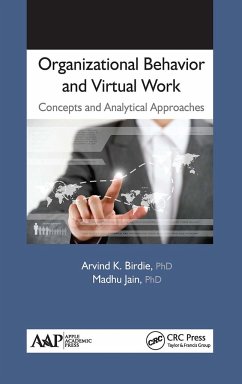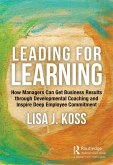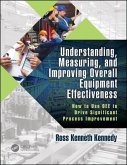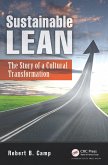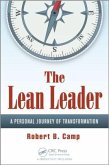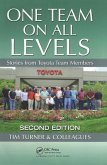Arvind K Birdie, Madhu Jain
Organizational Behavior and Virtual Work
Concepts and Analytical Approaches
Arvind K Birdie, Madhu Jain
Organizational Behavior and Virtual Work
Concepts and Analytical Approaches
- Broschiertes Buch
- Merkliste
- Auf die Merkliste
- Bewerten Bewerten
- Teilen
- Produkt teilen
- Produkterinnerung
- Produkterinnerung
Organizational Behavior and Virtual Work: Concepts and Research shows the enormous impact of technology and globalization on employment relationships and also predicts how they will contribute to the changing dimensions of organizations in the future. With a unique blend of theory and application in the real world of virtual workers, the book presents the most recent research and developments in the relatively new and still emerging area of virtual work. It takes an in-depth critical look into the key factors affecting the virtual work environment with practical inputs of suggestions and recommendations.…mehr
Andere Kunden interessierten sich auch für
![Leading for Learning Leading for Learning]() Lisa KossLeading for Learning45,99 €
Lisa KossLeading for Learning45,99 €![Lean Production for the Small Company Lean Production for the Small Company]() Mike ElbertLean Production for the Small Company71,99 €
Mike ElbertLean Production for the Small Company71,99 €![Understanding, Measuring, and Improving Overall Equipment Effectiveness Understanding, Measuring, and Improving Overall Equipment Effectiveness]() Ross Kenneth KennedyUnderstanding, Measuring, and Improving Overall Equipment Effectiveness53,99 €
Ross Kenneth KennedyUnderstanding, Measuring, and Improving Overall Equipment Effectiveness53,99 €![Sustainable Lean Sustainable Lean]() Robert B CampSustainable Lean39,99 €
Robert B CampSustainable Lean39,99 €![The Lean Leader The Lean Leader]() Robert B CampThe Lean Leader48,99 €
Robert B CampThe Lean Leader48,99 €![Epiphanized Epiphanized]() Bob SproullEpiphanized58,99 €
Bob SproullEpiphanized58,99 €![One Team on All Levels One Team on All Levels]() Tim TurnerOne Team on All Levels40,99 €
Tim TurnerOne Team on All Levels40,99 €-
-
-
Organizational Behavior and Virtual Work: Concepts and Research shows the enormous impact of technology and globalization on employment relationships and also predicts how they will contribute to the changing dimensions of organizations in the future. With a unique blend of theory and application in the real world of virtual workers, the book presents the most recent research and developments in the relatively new and still emerging area of virtual work. It takes an in-depth critical look into the key factors affecting the virtual work environment with practical inputs of suggestions and recommendations.
Hinweis: Dieser Artikel kann nur an eine deutsche Lieferadresse ausgeliefert werden.
Hinweis: Dieser Artikel kann nur an eine deutsche Lieferadresse ausgeliefert werden.
Produktdetails
- Produktdetails
- Verlag: Taylor & Francis Ltd (Sales)
- Seitenzahl: 296
- Erscheinungstermin: 31. März 2021
- Englisch
- Abmessung: 229mm x 152mm x 16mm
- Gewicht: 399g
- ISBN-13: 9781774635896
- ISBN-10: 1774635895
- Artikelnr.: 69925168
- Herstellerkennzeichnung
- Libri GmbH
- Europaallee 1
- 36244 Bad Hersfeld
- gpsr@libri.de
- Verlag: Taylor & Francis Ltd (Sales)
- Seitenzahl: 296
- Erscheinungstermin: 31. März 2021
- Englisch
- Abmessung: 229mm x 152mm x 16mm
- Gewicht: 399g
- ISBN-13: 9781774635896
- ISBN-10: 1774635895
- Artikelnr.: 69925168
- Herstellerkennzeichnung
- Libri GmbH
- Europaallee 1
- 36244 Bad Hersfeld
- gpsr@libri.de
Arvind K. Birdie, PhD, is an associate professor and acting principal at IIMT School of Management (Oxford Brooks University), Gurgaon, India. Dr. Birdie has been consistently recognized for her teaching abilities. As an avid reader, her strength lies in teaching various interdisciplinary subjects with equal ease. Besides academic teaching and training, she has organized management development programs for corporate and academicians. She is a regular presenter at various international and national conferences and has published several papers in refereed journals. Her areas of interest include leadership, work-life balance, virtual work, and positive psychology. She is taking post-graduate and graduate courses of management for over 12 years. Madhu Jain, PhD, is presently associate professor in the Department of Psychology at the University of Rajasthan, Jaipur, India. She is also director of the Department of Life Long Learning, also at the University of Rajasthan, Jaipur, India. She has been teaching and guiding postgraduate, graduate, and PhD students for over two decades and has supervised several research projects at the advanced level as well. Dr. Jain has published nearly 40 papers in scholarly national and international journals and also published four books in the area of psychology. Dr. Jain is associated with many national and international associations. As a student, she was a Gold Medalist and Merit Holder at the graduate and postgraduate level.
Preface
PART I: Introduction of Concepts
Organizations
Traditional Organizations
Cultural Perspective
Elements of Organizations
Challenges of Organizational Design
Dimensions of Structure
Contemporary Organizational Designs
Challenges for Today's Organizational Design
Organizational Life Cycle
Organizational Culture
Is It Possible to Change Corporate Culture?
Leadership
How Do We Define Leadership?
Are Leaders Born or Made?
Leaders versus Managers
Qualities of Leaders
The Personality Profile of Effective Leaders
Leadership Attitudes
Ethics and Leadership
The Role of Leadership in Organization
Leadership Theories
Team in Organization
The Four Roles of Leadership
The Leadership Challenge
Guidelines for Leading Meetings
Activities of Successful and Effective Leaders
Goals, Values, and Concepts
Roles and Relationships
Determination of Effective Leadership: Various Dimensions
How Founders/Leaders Embed and Transmit Culture
Self Efficacy
Positive Organizational Behavior
Positive Psychology
Basic Social Learning Concepts
Trust
Definition
Types of Trust
Barriers to Building a Culture for Trust in Organizations
Leadership and Organizational Trust
Measuring Organizational Trust
How to Develop Trust in Organizations
Trust and Globalization
Work Life Balance
Introduction
Work Life Balance Defined
Dual Career Families
Work Life Balance Initiatives
Demographic Factors
Organizational Factors
Studies on Work Life Balance
Women and Family
Globalization and Virtual Work
Introduction
Emerging Trends in Employment Relationships
Diversity Issues
PART II: Research and Critical Analysis
Research on the Relation Between Leadership Effectiveness, Perceived Organizational Climate, Interpersonal Trust and Self Efficacy Among Virtual Workers In Different Organization: Introduction
Virtual Workers
Leadership Effectiveness
Self Efficacy
Trust
Job Involvement
Review of Literature
Studies of Organizational Climate
Studies of Leadership
Studies of Self Efficacy
Studies of Trust
Studies of Job Involvement
Research Design
Rationale of the Study
Objectives
Hypothesis
Variables
Research Design
Methodology
Rationale of the Sample
Distribution of the Sample
Measures and Scoring Methods
Procedure
Statistical Analysis
Results
Discussion
Summary and Conclusion
Limitations, Suggestions, and Implications
Index
PART I: Introduction of Concepts
Organizations
Traditional Organizations
Cultural Perspective
Elements of Organizations
Challenges of Organizational Design
Dimensions of Structure
Contemporary Organizational Designs
Challenges for Today's Organizational Design
Organizational Life Cycle
Organizational Culture
Is It Possible to Change Corporate Culture?
Leadership
How Do We Define Leadership?
Are Leaders Born or Made?
Leaders versus Managers
Qualities of Leaders
The Personality Profile of Effective Leaders
Leadership Attitudes
Ethics and Leadership
The Role of Leadership in Organization
Leadership Theories
Team in Organization
The Four Roles of Leadership
The Leadership Challenge
Guidelines for Leading Meetings
Activities of Successful and Effective Leaders
Goals, Values, and Concepts
Roles and Relationships
Determination of Effective Leadership: Various Dimensions
How Founders/Leaders Embed and Transmit Culture
Self Efficacy
Positive Organizational Behavior
Positive Psychology
Basic Social Learning Concepts
Trust
Definition
Types of Trust
Barriers to Building a Culture for Trust in Organizations
Leadership and Organizational Trust
Measuring Organizational Trust
How to Develop Trust in Organizations
Trust and Globalization
Work Life Balance
Introduction
Work Life Balance Defined
Dual Career Families
Work Life Balance Initiatives
Demographic Factors
Organizational Factors
Studies on Work Life Balance
Women and Family
Globalization and Virtual Work
Introduction
Emerging Trends in Employment Relationships
Diversity Issues
PART II: Research and Critical Analysis
Research on the Relation Between Leadership Effectiveness, Perceived Organizational Climate, Interpersonal Trust and Self Efficacy Among Virtual Workers In Different Organization: Introduction
Virtual Workers
Leadership Effectiveness
Self Efficacy
Trust
Job Involvement
Review of Literature
Studies of Organizational Climate
Studies of Leadership
Studies of Self Efficacy
Studies of Trust
Studies of Job Involvement
Research Design
Rationale of the Study
Objectives
Hypothesis
Variables
Research Design
Methodology
Rationale of the Sample
Distribution of the Sample
Measures and Scoring Methods
Procedure
Statistical Analysis
Results
Discussion
Summary and Conclusion
Limitations, Suggestions, and Implications
Index
Preface
PART I: Introduction of Concepts
Organizations
Traditional Organizations
Cultural Perspective
Elements of Organizations
Challenges of Organizational Design
Dimensions of Structure
Contemporary Organizational Designs
Challenges for Today's Organizational Design
Organizational Life Cycle
Organizational Culture
Is It Possible to Change Corporate Culture?
Leadership
How Do We Define Leadership?
Are Leaders Born or Made?
Leaders versus Managers
Qualities of Leaders
The Personality Profile of Effective Leaders
Leadership Attitudes
Ethics and Leadership
The Role of Leadership in Organization
Leadership Theories
Team in Organization
The Four Roles of Leadership
The Leadership Challenge
Guidelines for Leading Meetings
Activities of Successful and Effective Leaders
Goals, Values, and Concepts
Roles and Relationships
Determination of Effective Leadership: Various Dimensions
How Founders/Leaders Embed and Transmit Culture
Self Efficacy
Positive Organizational Behavior
Positive Psychology
Basic Social Learning Concepts
Trust
Definition
Types of Trust
Barriers to Building a Culture for Trust in Organizations
Leadership and Organizational Trust
Measuring Organizational Trust
How to Develop Trust in Organizations
Trust and Globalization
Work Life Balance
Introduction
Work Life Balance Defined
Dual Career Families
Work Life Balance Initiatives
Demographic Factors
Organizational Factors
Studies on Work Life Balance
Women and Family
Globalization and Virtual Work
Introduction
Emerging Trends in Employment Relationships
Diversity Issues
PART II: Research and Critical Analysis
Research on the Relation Between Leadership Effectiveness, Perceived Organizational Climate, Interpersonal Trust and Self Efficacy Among Virtual Workers In Different Organization: Introduction
Virtual Workers
Leadership Effectiveness
Self Efficacy
Trust
Job Involvement
Review of Literature
Studies of Organizational Climate
Studies of Leadership
Studies of Self Efficacy
Studies of Trust
Studies of Job Involvement
Research Design
Rationale of the Study
Objectives
Hypothesis
Variables
Research Design
Methodology
Rationale of the Sample
Distribution of the Sample
Measures and Scoring Methods
Procedure
Statistical Analysis
Results
Discussion
Summary and Conclusion
Limitations, Suggestions, and Implications
Index
PART I: Introduction of Concepts
Organizations
Traditional Organizations
Cultural Perspective
Elements of Organizations
Challenges of Organizational Design
Dimensions of Structure
Contemporary Organizational Designs
Challenges for Today's Organizational Design
Organizational Life Cycle
Organizational Culture
Is It Possible to Change Corporate Culture?
Leadership
How Do We Define Leadership?
Are Leaders Born or Made?
Leaders versus Managers
Qualities of Leaders
The Personality Profile of Effective Leaders
Leadership Attitudes
Ethics and Leadership
The Role of Leadership in Organization
Leadership Theories
Team in Organization
The Four Roles of Leadership
The Leadership Challenge
Guidelines for Leading Meetings
Activities of Successful and Effective Leaders
Goals, Values, and Concepts
Roles and Relationships
Determination of Effective Leadership: Various Dimensions
How Founders/Leaders Embed and Transmit Culture
Self Efficacy
Positive Organizational Behavior
Positive Psychology
Basic Social Learning Concepts
Trust
Definition
Types of Trust
Barriers to Building a Culture for Trust in Organizations
Leadership and Organizational Trust
Measuring Organizational Trust
How to Develop Trust in Organizations
Trust and Globalization
Work Life Balance
Introduction
Work Life Balance Defined
Dual Career Families
Work Life Balance Initiatives
Demographic Factors
Organizational Factors
Studies on Work Life Balance
Women and Family
Globalization and Virtual Work
Introduction
Emerging Trends in Employment Relationships
Diversity Issues
PART II: Research and Critical Analysis
Research on the Relation Between Leadership Effectiveness, Perceived Organizational Climate, Interpersonal Trust and Self Efficacy Among Virtual Workers In Different Organization: Introduction
Virtual Workers
Leadership Effectiveness
Self Efficacy
Trust
Job Involvement
Review of Literature
Studies of Organizational Climate
Studies of Leadership
Studies of Self Efficacy
Studies of Trust
Studies of Job Involvement
Research Design
Rationale of the Study
Objectives
Hypothesis
Variables
Research Design
Methodology
Rationale of the Sample
Distribution of the Sample
Measures and Scoring Methods
Procedure
Statistical Analysis
Results
Discussion
Summary and Conclusion
Limitations, Suggestions, and Implications
Index

